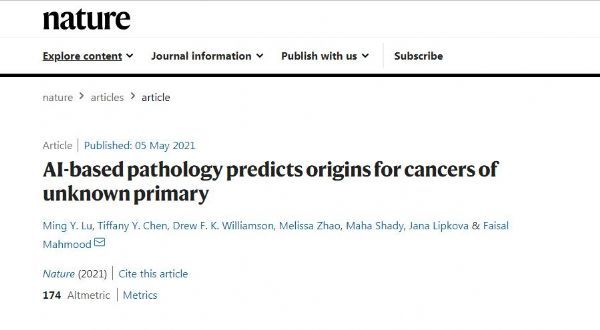Artificial intelligence may improve the diagnosis of metastatic cancers
- A Single US$2.15-Million Injection to Block 90% of Cancer Cell Formation
- WIV: Prevention of New Disease X and Investigation of the Origin of COVID-19
- Why Botulinum Toxin Reigns as One of the Deadliest Poisons?
- FDA Approves Pfizer’s One-Time Gene Therapy for Hemophilia B: $3.5 Million per Dose
- Aspirin: Study Finds Greater Benefits for These Colorectal Cancer Patients
- Cancer Can Occur Without Genetic Mutations?
Nature: New artificial intelligence system may improve the diagnosis of a variety of complex metastatic cancers in humans
Artificial intelligence may improve the diagnosis of metastatic cancers. Cancer of unknown primary (CUP, Cancer of unknown primary) is a very mysterious form of cancer diagnosis, that is, the main primary site of tumor origin cannot be determined, which is a huge challenge for scientists.
Because modern treatment methods mainly target primary tumors; recent research has focused on the use of genomics and transcriptomics to identify the origin of tumors; however, genomic testing is not always effective and lacks in low-resource environments Certain clinical permeability.

In order to improve the diagnosis of patients with complex metastatic cancer, a research report entitled “AI-based pathology predicts origins for cancers of unknown primary” was published in the international journal Nature. Scientists from Harvard Medical School and other institutions approved Research has developed an artificial intelligence system that can use routinely obtained histological slices to accurately find the origin of metastatic tumors, and at the same time produce a “differential diagnosis” strategy for patients with unidentified primary cancers. diagnosis.
In 1%-2% of cancer cases, researchers cannot determine the primary site of tumor origin. Since many modern cancer therapies target the primary tumor, diagnostic techniques for unidentified primary cancers are often relatively lacking. Moreover, the median overall survival of patients is only 2.7-16 months. In order to be able to make a more specific diagnosis, cancer patients usually have to receive a wide range of diagnosis, which includes additional laboratory tests, biopsy and endoscopy. Procedures, this will undoubtedly delay the treatment of patients.
In this study, the artificial intelligence system developed by the researchers can help improve the diagnosis of patients with complex metastatic cancer, especially in areas with low-level resources; it can use routinely obtained tissue sections to find the origin of metastatic tumors, and at the same time It can also produce a differential diagnosis strategy for patients with cancer of unknown origin. Faisal Mahmood, the corresponding author of the article, pointed out that almost every patient diagnosed with cancer will have a histological section, which has been the standard for diagnosis for more than 100 years. The research in this article provides scientists with a way to use the universal The data obtained and the power of artificial intelligence help improve the diagnosis of these complex cancer cases that usually require a lot of diagnostic work.
The deep learning-based algorithm developed by the researchers is called the TOAD algorithm (Tumor Origin Assessment via Deep Learning), which can simultaneously identify whether the tumor is primary or metastatic. The site of its origin can be predicted. Researchers trained this model using gigapixel full slices of tumor case studies from more than 22,000 cancer cases, then tested the TOAD algorithm in approximately 6,500 known primary cases and analyzed increasingly complex metastases. Cancer cases, to build an artificial intelligence model for unidentified primary cancers. For tumors of known primary origin, the model can accurately identify cancer 83% of the time and list the diagnosis in the top three predictive results 96% of the time. The researchers then tested the model in 317 cases of unidentified cancer and made a differential diagnosis of the cases. They found that the TOAD diagnosis was consistent with the pathologist’s report 61% of the time, and in 82% of the cases. Consistent with the top three prediction results.
The performance of the TOAD algorithm is basically the same as that of several recent research reports that use genomic data to predict the origin of tumors; although genome-based artificial intelligence technology can provide an alternative method to assist in cancer diagnosis, genomic testing is not always It can play a role in the patient’s body, especially in areas with low-level resources. For this reason, researchers hope to continue to train this histology-based model in more cases and participate in more clinical trials to determine whether this new algorithm can help improve cancer diagnosis and patient prognosis prediction.
The top predictive ability of this new model can accelerate the diagnosis and subsequent treatment of the disease by reducing the number of auxiliary tests required, reducing additional tissue sampling, and the overall time required to diagnose the patient, which may be long and stressful; The top three prediction results may be used to guide the pathologist’s next step, and in an environment lacking case study expertise, the highest prediction may be potentially used to specify differential diagnosis; Slice images are the first step for artificial intelligence-assisted cancer origin prediction. Of course, this is also a research field that is very exciting for scientists. In the future, it may be expected to standardize the diagnosis process and improve current cancer diagnosis strategies.
In summary, the TOAD algorithm may be used as an auxiliary diagnostic tool for differential diagnosis of complex metastatic tumors and unidentified primary cancer types, and can be combined with auxiliary examinations and extensive diagnostic tests to reduce unidentified primary cancers. The rate of occurrence.
(source:internet, reference only)
Disclaimer of medicaltrend.org



